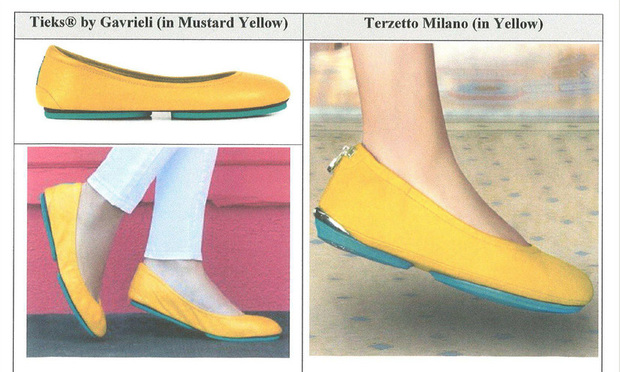Daily Dicta: For Morgan Lewis, These (Cute) Shoes Are Worth Fighting Over
Bringing a successful patent and trade dress infringement suit on behalf of one ballet flat shoemaker against another is no walk in the park.
May 08, 2019 at 12:52 PM
6 minute read
 Shoe comparison photos from civil action complaint Gavrieli Brands LLC vs Soto Massini (USA) Corp.
Shoe comparison photos from civil action complaint Gavrieli Brands LLC vs Soto Massini (USA) Corp.
Anyone who has ever set foot in a DSW knows that the shoe warehouse has rows filled with women's ballet flats. One pair might have little bows, another shiny buckles, but mostly, they all look pretty similar: a rounded toe and the barest hint of a heel.
Which makes bringing a successful patent and trade dress infringement suit on behalf of one ballet flat shoemaker against another no walk in the park.
On May 3, a team from Morgan, Lewis & Bockius convinced a federal jury in Delaware to find for their client, Gavrieli Brands, which makes Tieks footwear.
The Italian leather flats are pricey, retailing for $175 to $345 a pair. Available in a rainbow of colors, the shoes have been touted in Oprah Winfrey's O Magazine, where they made the “O List” as well as her list of “Mother's Day Gifts She Really Wants.” (For the record, I would indeed like a pair.)
What sets them apart? For one, their signature sky-blue soles.
“To reinforce the brand significance of the color blue, Gavrieli's advertising and promotional efforts from as early as 2011 to present have consistently focused on educating the public to associate a blue outsole as applied to shoes with Tieks,” wrote David Marston Jr., Amy Dudash, Michael Lyons, Ehsun Forghany, Sharon Smith and Brett Lovejoy from Morgan Lewis in a complaint filed last year in U.S. District Court in the District of Delaware.
The Morgan Lewis team declined comment.
To protect the look, Gavrieli secured several design patents for the shoes.
 The shoe company also stresses the blue theme in its ads and promotions. For example, Tiek tag lines include “Say 'I Do' In Tiek Blue,” “I'm Dreaming of a Tiek Blue Christmas,” and “A Tiek Blue Dream Come True.” When you buy a pair of the shoes, you even get a handwritten note that says “We Look Forward to Seeing Where Your Blue Prints Take You.”
The shoe company also stresses the blue theme in its ads and promotions. For example, Tiek tag lines include “Say 'I Do' In Tiek Blue,” “I'm Dreaming of a Tiek Blue Christmas,” and “A Tiek Blue Dream Come True.” When you buy a pair of the shoes, you even get a handwritten note that says “We Look Forward to Seeing Where Your Blue Prints Take You.”
Suffice to say, Gavrieli didn't appreciate it when a start-up shoe company, Soto Massini, moved to launch its own line of flats with blue soles called Terzetto Milano. Soto Massini allegedly raised nearly $700,000 via a kickstarter campaign using photos of awfully similar-looking shoes.
“Instead of trying to create their own distinctive product design, defendants chose to embark on a campaign that systematically copied Gavrieli's distinctive footwear in order to improperly trade on the goodwill Gavrieli has spent years building in the marketplace and blatantly infringing Gavrieli's intellectual property,” the Morgan Lewis team wrote.
Represented by Stephen Lobbin of Foundation Law Group and Stamatios Stamoulis of Stamoulis & Weinblatt (who both declined comment), Soto Massini pushed back hard.
“Ballet flats have been a staple of women's fashion at least since Brigitte Bardot and Audrey Hepburn popularized them in the 1950's. Even a cursory online search reveals dozens of designs that look far more similar to plaintiff's than does defendants' design,” defense counsel claimed.
“Here, infringement is unlikely because no ordinary observer would be deceived into thinking plaintiff's and defendants' designs are the same,” they continued. “The most glaring difference between the two designs is that defendants' shoe is much larger, because of the built-in orthotic support. Plaintiff's design, by contrast, is minimalistic in order to fold in half.”
They argued that the shoemakers are going after different markets. Defendants are targeting “women who want a stylish looking ballet flat that functions like a sneaker or orthopedic health shoe. Plaintiff targets women who want a ballet flat that is foldable” and can fit in a purse.
As for the blue sole, Soto Massini said it “immediately dropped any 'blue-color' option for its soles as a compromise. Therefore, the blue sole color is no longer at issue.”
You might think that would be the end of it—but you would be wrong. In fact, the case only got nastier.
Soto Massini turned around and brought counter-claims against Gavrieli including false advertising. For starters, they disputed the claim that Tieks offer “unparalleled comfort, flexibility, durability, and style.”
“On information and belief, Tieks brand flats are neither comfortable nor durable, and certainly not to the extent Gavrieli claims,” Soto Massini wrote.
That's non-actionable puffery, the Morgan Lewis team responded—plus it's not the kind of thing that can even be factually verified.
Soto Massini also said that while Tieks boast about being made of Italian leather, the shoes are actually manufactured in China.
So what, the Morgan Lewis team responded. “[I]t is entirely true that Tieks are made with real Italian leather.” Moreover, they said, a false advertising claim can't be based on omitting a fact, such as where the shoes are made.
The Morgan Lewis lawyers, in turn, asked the court to sanction Soto Massini for failing to comply with discovery requests.
For example, the plaintiffs asked Soto Massini for all customer communications referencing “Gavrieli” and/or “Tieks.” Through independent investigation, the Morgan Lewis lawyers uncovered at least three messages that weren't produced.
They also didn't get any records of sales orders. “Gavrieli knows these sales orders exist because a Morgan Lewis paralegal and the infringement expert retained in this case both received a sales order record with a unique order number immediately after purchasing the accused products on Shopify.”
They also accused Soto Massini founder Thomas Pichler of “falsely representing under oath that the accused products were never made or sold prior to this suit (initiated in 2018), and that the accused products were never sold in Italy or in any brick-and-mortar store.”
Soto Massini responded that “any discrepancy between Mr. Pichler's deposition testimony and the documents produced can easily be attributed to an honest mistake, not a willful lie made in bad faith.”
In the end, it was up to the jury. After a five-day trial before U.S. District Judge Maryellen Noreika, the jury found Soto Massini willfully infringed four Tieks design patents, that the patents were valid, and that Soto Massini also willfully infringed Tieks trade dress. The jurors awarded at least $2.1 million in damages.
This content has been archived. It is available through our partners, LexisNexis® and Bloomberg Law.
To view this content, please continue to their sites.
Not a Lexis Subscriber?
Subscribe Now
Not a Bloomberg Law Subscriber?
Subscribe Now
NOT FOR REPRINT
© 2025 ALM Global, LLC, All Rights Reserved. Request academic re-use from www.copyright.com. All other uses, submit a request to [email protected]. For more information visit Asset & Logo Licensing.
You Might Like
View All
How Kirkland Litigators and Restructuring Lawyers Partner on Bankruptcy Work

Litigators of the Week: Hitting Walmart With a $100M Verdict in Its Own Backyard

Litigator of the Week: Standing Strong for Under Armour's Trademarks Without Going Overboard Against Upstart Armorina

How a Luxury Designer Made the Case 'Adidas Does Not Own Stripes'
Trending Stories
- 1SurePoint Acquires Legal Practice Management Company ZenCase
- 2Day Pitney Announces Partner Elevations
- 3The New Rules of AI: Part 2—Designing and Implementing Governance Programs
- 4Plaintiffs Attorneys Awarded $113K on $1 Judgment in Noise Ordinance Dispute
- 5As Litigation Finance Industry Matures, Links With Insurance Tighten
Who Got The Work
J. Brugh Lower of Gibbons has entered an appearance for industrial equipment supplier Devco Corporation in a pending trademark infringement lawsuit. The suit, accusing the defendant of selling knock-off Graco products, was filed Dec. 18 in New Jersey District Court by Rivkin Radler on behalf of Graco Inc. and Graco Minnesota. The case, assigned to U.S. District Judge Zahid N. Quraishi, is 3:24-cv-11294, Graco Inc. et al v. Devco Corporation.
Who Got The Work
Rebecca Maller-Stein and Kent A. Yalowitz of Arnold & Porter Kaye Scholer have entered their appearances for Hanaco Venture Capital and its executives, Lior Prosor and David Frankel, in a pending securities lawsuit. The action, filed on Dec. 24 in New York Southern District Court by Zell, Aron & Co. on behalf of Goldeneye Advisors, accuses the defendants of negligently and fraudulently managing the plaintiff's $1 million investment. The case, assigned to U.S. District Judge Vernon S. Broderick, is 1:24-cv-09918, Goldeneye Advisors, LLC v. Hanaco Venture Capital, Ltd. et al.
Who Got The Work
Attorneys from A&O Shearman has stepped in as defense counsel for Toronto-Dominion Bank and other defendants in a pending securities class action. The suit, filed Dec. 11 in New York Southern District Court by Bleichmar Fonti & Auld, accuses the defendants of concealing the bank's 'pervasive' deficiencies in regards to its compliance with the Bank Secrecy Act and the quality of its anti-money laundering controls. The case, assigned to U.S. District Judge Arun Subramanian, is 1:24-cv-09445, Gonzalez v. The Toronto-Dominion Bank et al.
Who Got The Work
Crown Castle International, a Pennsylvania company providing shared communications infrastructure, has turned to Luke D. Wolf of Gordon Rees Scully Mansukhani to fend off a pending breach-of-contract lawsuit. The court action, filed Nov. 25 in Michigan Eastern District Court by Hooper Hathaway PC on behalf of The Town Residences LLC, accuses Crown Castle of failing to transfer approximately $30,000 in utility payments from T-Mobile in breach of a roof-top lease and assignment agreement. The case, assigned to U.S. District Judge Susan K. Declercq, is 2:24-cv-13131, The Town Residences LLC v. T-Mobile US, Inc. et al.
Who Got The Work
Wilfred P. Coronato and Daniel M. Schwartz of McCarter & English have stepped in as defense counsel to Electrolux Home Products Inc. in a pending product liability lawsuit. The court action, filed Nov. 26 in New York Eastern District Court by Poulos Lopiccolo PC and Nagel Rice LLP on behalf of David Stern, alleges that the defendant's refrigerators’ drawers and shelving repeatedly break and fall apart within months after purchase. The case, assigned to U.S. District Judge Joan M. Azrack, is 2:24-cv-08204, Stern v. Electrolux Home Products, Inc.
Featured Firms
Law Offices of Gary Martin Hays & Associates, P.C.
(470) 294-1674
Law Offices of Mark E. Salomone
(857) 444-6468
Smith & Hassler
(713) 739-1250






